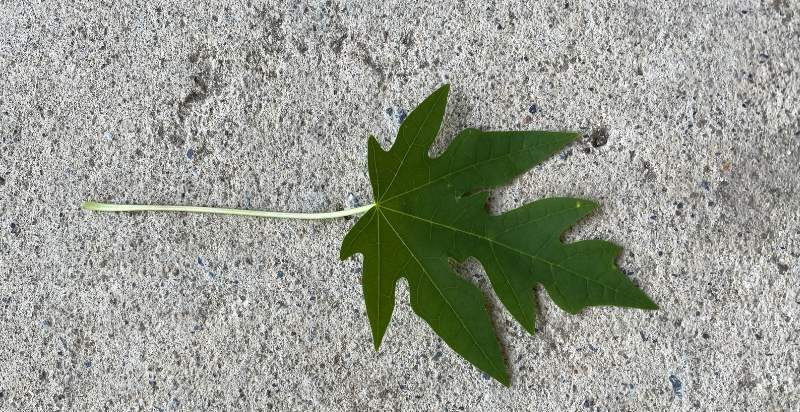Papaya leaves have been used for centuries in various cultures worldwide to aid digestive health, boost immunity, and relieve various ailments. Papaya leaves contain various vitamins and minerals that support good health and well-being. This article will discuss the benefits of papaya leaves, their nutritional content, and how they are used medicinally.
Description / Taste of Papaya Leaves :
Papaya leaves have a slightly bitter and astringent taste, with notes of anise and citrus. They are often compared to the taste of black tea and have a sharp, acidic flavor balanced by their flesh’s sweetness. The leaves can be eaten raw or cooked, making them a great addition to salads, soups, and stir-fries.
Seasons /Availability of Papaya Leaves :
Papaya leaves can be found at select grocery stores during certain parts of the year, depending on availability. In general, these leaves are most readily available during the summer when they are widely harvested and sold from local farmers’ markets.
During winter, papaya leaves may still be available in some areas but may be harder to find. The best way to ensure access to fresh papaya leaves is to source them directly from a trusted farmer or market. Dried or frozen varieties of papaya leaves are also widely available online year-round for those who cannot source them locally.

Nutritional Value of Papaya Leaves :
Papaya leaves contain many beneficial compounds, including flavonoids, phenolic acids, and saponins. In addition to being rich in antioxidants, papaya leaves have anti-inflammatory and anticancer properties. The leaf’s high vitamin C content can help boost the immune system and reduce inflammation.
Other vitamins and minerals in papaya leaves include Vitamin A, B1 (thiamine), Vitamin B2 (riboflavin), folate, potassium, magnesium, zinc, iron, and phosphorus. Papaya also contains an enzyme known as papain, which is helpful in digestion. Studies have shown that extracts from papaya leaves have been effective at treating dengue fever due to their antiviral properties.
Additionally, the leaves are believed to affect symptoms of diabetes and cholesterol levels positively. Papaya leaves can be eaten raw or cooked in a variety of dishes, or they can be dried, powdered, and taken as a supplement. They have a slightly bitter taste that some people find off-putting, but they can add flavor and nutrition to many dishes. Finally, papaya leaves have long been used in traditional medicine for their healing properties.
Day-to-Day Applications of Papaya Leaves :
Papaya leaves have been used for centuries as a natural remedy in traditional medicine, but the potential medicinal properties of this tropical fruit are now being explored in modern science. The active compounds in papaya leaves have exhibited antibacterial, antifungal, and antiviral properties. They are also believed to be beneficial for digestive health, wound healing, skincare, and cancer prevention. In this section, we will discuss the various day-to-day applications of papaya leaves and how they can be incorporated into our lives.
Digestive Health :
One of the primary benefits of consuming papaya leaves is that it helps improve digestion. Papain is an enzyme found in papayas that can help break down proteins and other substances, making it easier for our bodies to absorb nutrients from food. Papain is also thought to help reduce inflammation in the stomach and intestines, which can lead to fewer digestive issues.
Wound Healing :
Papaya leaves are believed to have wound-healing properties. Compounds found in papaya leaves may help speed up the healing process of wounds by stimulating blood flow, increasing collagen production, and fighting infection-causing bacteria. Studies have also found that applying papaya leaf extract to a wound can reduce inflammation and decrease pain.
Skin Care :
Papaya leaves contain an enzyme called alphahydroxy acids (AHAs) which are believed to be beneficial for skin health. AHAs help to remove dead skin cells and improve cell turnover, making the skin appear smoother. The enzymes in papaya leaves are also said to help reduce skin wrinkles, acne, and other blemishes.
Cancer Prevention :
Papaya leaves are rich in compounds like flavonoids and polyphenols, which possess antioxidant properties. These antioxidants can help protect your body from free radical damage, which is thought to contribute to cancer development. Studies have shown that consuming papaya leaf extract can significantly reduce the risk of certain cancers, including breast and prostate cancer.
Papaya leaves have many potential health benefits and are now being explored by modern science as a natural remedy for various ailments. From digestive health to wound healing, skincare, and even cancer prevention, papaya leaves can be a great addition to our daily lives.
Conclusion :
In conclusion, papaya leaves have long been used in traditional medicine for their healing properties. This tropical fruit contains various active compounds and enzymes like papain, alphahydroxy acids, and flavonoids with potential health benefits. From digestive health to wound healing, skincare, and cancer prevention, adding papaya leaves to our daily lives can be a great way to reap the benefits of this powerful tropical fruit.
- Everything You Wanted to Know About Red Tamarillos - June 2, 2025
- A Guide to Tulips: Everything You Need to Know & More… - June 2, 2025
- Guanabana: Description, Flavor, Benefits, And Uses - May 27, 2025

2 thoughts on “Papaya Leaves Benefits, Nutritional Value, And Uses”
Comments are closed.